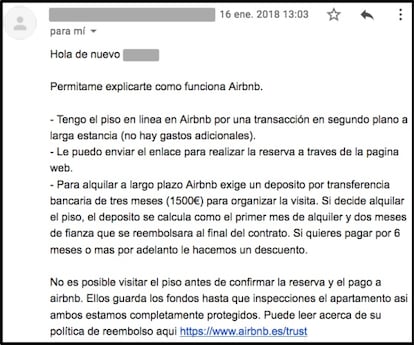From the ‘Airbnb scam’ to phishing: how to spot fraud when flat-hunting
Learn how to identify the signs of scammers in the Spanish market, who will often advertise properties that seem too good to be true, and will always be in a hurry to close the deal

In 2013, when she was 25 years old, María Martín-Consuegra found the perfect apartment. “It was a flat in Ronda de Toledo [Madrid] for one person, it was just what I was looking for,” she explains. “The rent was €400. It was a bargain. I thought I’d been really lucky.” But what looked like good fortune was in fact a scam. When she got to see the apartment, she paid €400 there and then to reserve it. The person who took the money disappeared. And all these years later, she is still waiting for the case to come to court so she can recoup her loss.
The summer and the first few weeks of September are good opportunities for fraudsters
Martín-Consuegra’s case is one of the many such fraudulent methods used in the rental market in Spain, and which are benefiting from a 50% rise in prices over the last five years. The situation is particularly tough for young people who are seeking a place to live, given that they have to contend with precarious employment and few options to buy their own properties. Renting is practically the only option left open to them. “[The con artists] will take advantage of anyone’s needs,” Martín-Consuegra says.
The summer and the first few weeks of September are good opportunities for fraudsters, as lots of students are looking for apartments in the big Spanish cities they are about to move to. As well as their urgency, conmen will also take advantage of the difficulties that potential tenants may have to see the property in person. These methods tend to be similar to the one suffered by Martín-Consuegra, but there are differences. Here are some of the most common scams used in the property market.
The Airbnb scam
This is one of the most common methods used by fraudsters. Properties are advertised on real estate listing sites such as Idealista. Once you have contacted the advertiser, the conversation is moved from the site’s messaging service to email. The fraudsters explain that they live far away and that they can show you the apartment if you leave them a deposit. If you don’t pay, you can’t see the property.

If the conversation continues, the fraudsters will send you a link to the property on online accommodation platform Airbnb. But the link does not take you to the official site, but rather a fake webpage that is made up to look like the real thing.
“They will try to close the sale or rental as fast as possible, and they won’t refuse any request that you make, no matter how extravagant it may be,” they explain from the Spanish Office of Internet Security (OSI). This scam has been carried out both with apartments that actually exist as well as invented ones.
The embassy employee scam
The properties advertised for this kind of fraud are usually of the luxury kind. As in the previous case, listings will appear on sites such as Idealista and Fotocasa. The fraudster claims to be a property owner who is living abroad, and is looking for someone to take good care of the property they have in Spain. They usually claim to have worked in an embassy in Spain and have now been transferred to another country.
Si buscas una 🏠 de alquiler, evita caer en trampas:
— Policía Nacional (@policia) June 10, 2019
☑Precios demasiado jugosos
☑Arrendador en el extranjero que pide pago por adelantado pic.twitter.com/Zxs6rnIOqx
“If you’re looking for a house to rent, avoid falling into traps: Prices that are too low, a landlord abroad asking for money in advance. National Police”
However, this method does not rely on Airbnb. In this case, the scammer will request a money transfer via a company such as MoneyGram or Western Union. The fraudster claims that this will prove your genuine interest in the property. They promise that once you have made the transfer, you will get the key to the front door.
Targeting confidential information
In some cases, scammers will not go straight for your money. They seek instead personal information in order to get access to your files, a process commonly known as “phishing.” The fraudster sends out an email that appears to come from Idealista, Fotocasa or a similar website. It requests information such as email addresses or passwords, which can later be used to insert malicious software on your computer in order to find sensitive information.
Has recibido un email sospechoso‼️:
— Policía Nacional (@policia) February 28, 2019
👉🏻Faltas de ortografía
👉🏻Frases mal construídas
👉🏻El remitente del email no se corresponde con la entidad o empresa del correo
NO PIQUES, es #PHISHING 🎣 pic.twitter.com/xW2QZ5oJRv
“You have received a suspicious email!! Spelling mistakes. Badly written sentences. The email sender is not from the same company or mail service. DON’T FALL FOR IT, it’s #PHISHING. National Police.”
Once a scammer has access to your files, they can collect logins and passwords for your online bank accounts. Other phishing methods involve imitating other commonly used websites, such as social networks, banks and email services.
Abusive conditions – not fraudulent, but they are illegal
Landlords in Spain can be very demanding with their tenants. It is not illegal for them to request personal information, including a copy of your work contract, your latest payslips or even a bank statement. They can even specify that the tenant must carry out renovation work while living in the property.
But there are other clauses that are considered to be abusive under Spanish law. For example, rental firms cannot request more than a month’s rent as a fianza, the refundable bond that must be paid on signing the contract. There is, however, no limit to how many months’ rent must be put down as a deposit on the property, and this has to be agreed on by the landlord and tenant. What’s more, contracts that last less than three years can be considered null and void, as can those that include excessive penalties for tenants who leave the property. Clauses can be included, however, that oblige the tenant to pay a month’s rent for each year left on the agreement should they leave before the time frame is up.
How to spot fraud
This is advice from the Spanish Office of Internet Security (OSI) on how to avoid scams when looking for properties.
- Be cautious of any offers with very low prices. If you're interested in a particular area, compare the rental cost with the rest of the offers in the same neighborhood.
- Be suspicious if you notice that the photos of the property have watermarks from a different website, or are the same as you have seen in other adverts.
- Don't trust landlords who say that they live abroad and for whatever reason are unable to show you the apartment in person.
- Don't trust anyone who suggests you make use of intermediaries to hand over the keys or the contract.
- Be alert if someone is in a hurry. Cybercriminals are always keen to close the deal as soon as possible.
- If they ask you for payments via anonymous wire transfer services, do not continue with the process. You should also avoid sending a transfer via a bank that does not have the same nationality as the alleged landlord.
English version by Simon Hunter.
Tu suscripción se está usando en otro dispositivo
¿Quieres añadir otro usuario a tu suscripción?
Si continúas leyendo en este dispositivo, no se podrá leer en el otro.
FlechaTu suscripción se está usando en otro dispositivo y solo puedes acceder a EL PAÍS desde un dispositivo a la vez.
Si quieres compartir tu cuenta, cambia tu suscripción a la modalidad Premium, así podrás añadir otro usuario. Cada uno accederá con su propia cuenta de email, lo que os permitirá personalizar vuestra experiencia en EL PAÍS.
¿Tienes una suscripción de empresa? Accede aquí para contratar más cuentas.
En el caso de no saber quién está usando tu cuenta, te recomendamos cambiar tu contraseña aquí.
Si decides continuar compartiendo tu cuenta, este mensaje se mostrará en tu dispositivo y en el de la otra persona que está usando tu cuenta de forma indefinida, afectando a tu experiencia de lectura. Puedes consultar aquí los términos y condiciones de la suscripción digital.









































